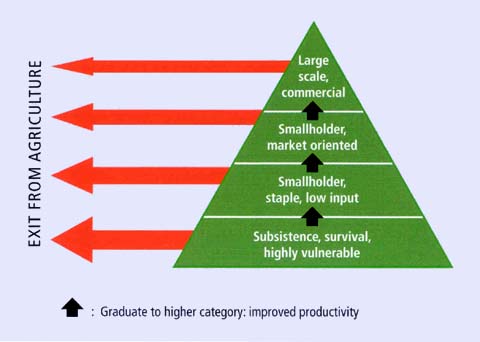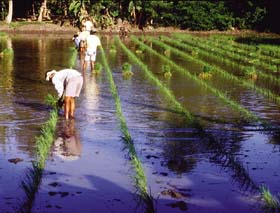In March 2003, the World Panel on Financing Water Infrastructure produced the document, “Financing Water for All”. The scenario adopted by the Panel considers the need to double annual investment to ensure global water security by 2025. This included all the major water-using sectors, such as households and municipalities, agriculture, industry & commerce, wastewater treatment, environmental uses, flood control and various other functions of water management.
Since the launch of the report considerable activity has been taken by many organizations, for example, a Working Group on Financing Water for Agriculture is being supported by a large number of international organizations, mainly the Water World Council (WWC), the Global Water Partnership (GWP), the World Bank, the International Fund for Agricultural Development, the International Water Management Institute (IWMI) and FAO through both its Water Service (AGLW) and the International Programme for Technology and Research in Irrigation and Drainage (IPTRID). The Group agreed to hold three consultations on this issue in Hyderabad (India), Alexandria (Egypt) and Pretoria (South Africa) leading to a fourth and “integrating” meeting to be held in Mexico within the context of the World Water Forum # 4, in March 2006.
In line with the proposed activities, the First Consultation was held in Hyderabad, India from 3 to 5 October 2005. The members of the group provided support in various ways. IPTRID agreed to fund the attendance of the regional participants, IWMI agreed to host the venue at their facilities, FAO/AGLW was instrumental in the identification of participants via its regional and country offices and contributed two resource persons. Finally, WWC and GWP put together the event's programme and likewise contributed with resource person and the identification of regional participants.
Twenty-five regional participants representing 10 countries (India, Pakistan, Nepal, Sri Lanka, China, Viet Nam, Thailand, Malaysia, Laos and Indonesia) were present. Seven participants representing international organizations brought the total attendance to 32 persons. These represented farmers, financing institutions, governments and international bodies. While an effort was made to balance these categories, the financing institutions were less represented while governments - both water related agencies and ministries of water resources and finance - had the upper hand.
The workshop's presentations were divided into three main categories to reflect the financing needs perspectives of a) farmers, b) financial institutions; and c) governments. The presentations and discussions revolved around central questions under each category, as follows:
Farmers: Access to finance. Considering investments in agricultural water management, what are the needs for financing and external funding, what mechanisms are available, what are the main constraints and problems faced and what improvements are required?
Finance Institutions: Availability of Finance. What mechanisms are available to meet the financing needs for agricultural water management, what are the main constraints and what innovations are introduced?
Governments: Creating the enabling environment. In what direction does government reform have to go to enable a wider spectrum of financial options and better access to finance?
Below some of the relevant issues emerging under each perspective and tied to the particular questions are summarized; while recognizing that these are not an exhaustive list they reflect the group discussions.
In relation to farmers’ perspectives, the needs for financing and external funding were identified primarily as: i) capital; ii) recurrent costs; iii) crop insurance; iv) equipment insurance; and v) output insurance. Regarding the financing mechanisms available the following loan types were identified: i) crops, ii) terms, and iii) consumption. Finally, the constraints more frequently mentioned were: i) the lack of collateral as security as normally requested by the financial institution; ii) the economic capacity of the farmers; and iii) the perceived high interest associated with the loans.
With respect to the question on current financing sources available these can be summarized as in amount-descending order: i) government; ii) multilateral organisms; iii) financial institutions; iv) official development agencies; v) community-based institutions, vi) water users and vii) Grant-related. The constraints associated with the financing, as expected, vary with the source, but include, among others, capacity, competition, fiscal deficit, policies and politics, regulatory frameworks and, specifically related to grants, the uncertainties involved. Finally, under this perspective, required innovations mentioned included the need to have a broad range of “products” that would fit different needs; the establishment of incentives associated with financial performance of clients, and the need to strengthen organizations to uplift their borrowing capacities.
In relation to governments’ perspectives on the direction that reforms should take to facilitate a better financing environment, there was almost a consensus that a first requirement is the establishment of clear water-related policies that stress and reflect the importance of the water resources and that describe at length the role and functionalities of the various actors/stakeholders. Also, there seemed to be a general agreement on the need for a water-related Apex Body to guide the whole process with cross-sectorial representation directed and linked to the highest governmental level possible. Participants recommended facilitating the creation of Public-Private-Partnerships (PPPs) that can provide greater flexibility on financing options. Likewise, participants manifested the need to encourage a broad range of financial institutions that can cater to the needs of all levels of the users “pyramid” (see figures). However, it was pointed out that there is also a need for a “one stop” institution, to avoid the multiplicity of steps currently faced by users in order to cover their financial needs. Finally, and very much in line with earlier recommendations, it was felt that irrigation performance-based incentives should be established to guide financing request allocations. Many farmer enterprises simply do not (or should not) qualify for financing given their dismal operations.
For more information contact Carlos Garces at: [email protected]

| Adapting agricultural strategies. | Source: Jean-Marc Faures (FAO) |
STAFF ARRIVALS
Hervé Lévite is a French government-seconded Senior Technical Officer. His appointment will last 2 years and consists mainly in contributing to project identification, formulation and technical implementation as well as the search for their funding. He will also assist the Programme Manager to maintain and strengthen the Programme's relationship with partners and donors, particularly in francophone countries. Before coming to IPTRID, Mr Lévite was responsible for the Water Resources Management mission at the French Ministry of Foreign Affairs (MAE). He also has past experience as an Adviser of the Minister of Agriculture in charge of Water Resources in the Republic of Djibouti, as a Research Project Manager at the International Water Management Institute (IWMI) and at CEMAGREF (France), and as a Technical Assistant of the Hydraulic Director (Niger).
Dominique Durlin is a French Government seconded Technical Officer joined IPTRID for a two-year appointment. He will assist the Programme Manager in the implementation of activities related to the uptake of research and exchange of technologies. He will also contribute to the organization of technical missions, and provide technical support to the on-going projects of IPTRID having a capacity development component. Mr Durlin has over 30 years of experience, including different posts as Adviser to the Minister of Water and Environment in Chad, Manager of the Food Aid Fund programme of the Ministry of Agriculture in Egypt, evaluation expert for the European Union in Senegal, Laos, Rwanda, as well as soil scientist/agronomist in different projects in Bangladesh, Indonesia, Madagascar, Niger, Nepal, Syria, Algeria and Yemen among others.
Federico Patimo joined the IPTRID Programme as Clerk since September 2005. He provides assistance to Staff as required but his main duty is the running of the new IPTRID Database. He manages the transition from the old system to the new and more efficient system which has become an excellent tool of data administration. He maintains and updates the database and despatches daily IPTRID publications upon request or to forthcoming events and/or IPTRID workshops.
STAFF DEPARTURES
Claudia Schubert joined IPTRID in the middle of November as volunteer for two months. She is studying water management at Dresden University of Technology, Germany, which concentrates on engineering and natural sciences. Her field of study is water conservation.
Ms Schubert assisted in completing the web site for the Virtual Centre for Water in Agriculture, supported the institutional mapping and needs assessment studies undertaken by national consultants in Cambodia and Viet Nam under the ESPIM Project, and assisted on issues related to the WCA-InfoNET information system performance and development.
ANNOUNCEMENTS
Mott MacDonald India Director, Mr Peter Lee, has been elected President of the International Commission on Irrigation and Drainage (ICID) at the Commission's 56th International Executive Council meeting held in Beijing in September. Peter was nominated by the British National Committee (ICID,UK) based at the Institution of Civil Engineers (ICE), London. He will serve for a three-year term.
Mr Lee is Managing Director of Mott MacDonald's Indian operations and coordinates the Group's business throughout South Asia. He has over 30 years experience of water resources development issues in Africa, West and South Asia and Europe and has worked for a variety of different national and international institutions, including the World Bank, FAO, UNDP and DFID (UK).
Associated with ICID for over 15 years, he was Chairman of the British National Committee 1992–94 and served on the ICE Water Board during the periods 1989–95 and 1998–99. He was elected a Vice-President of ICID 1997–2000 and has chaired a number of ICID work bodies. He has taken a particular interest in the financial sustainability of irrigation systems and agencies and broadening the membership of ICID national committees. He is Chairman of the International Programme for Technology and Research in Irrigation and Drainage (IPTRID), hosted by FAO in Rome.
He has also served on a number business groups and is currently a member of the British Business Group, Mumbai and the Water Committee of the Confederation of Indian Industry.
IPTRID
The uptake of Research and Exchange of Technology and Innovations in irrigation and drainage for a sustainable agriculture
The International Programme for Technology and Research in Irrigation and Drainage (IPTRID) is a multidonor trust fund managed by the IPTRID Secretariat as a Special Programme of FAO. The Secretariat is located in the Land and Water Development Division of FAO and draws on a worldwide network of leading centres of excellence in the field of irrigation, drainage and water resources management.
IPTRID aims at improving the uptake of research, exchange of technology and mamagement innovations by means of capacity development in the irrigation and drainage systems and sectors of developing countries to reduce poverty, enhance food security and improve livelihoods, while conserving the envrionment. IPTRID acts as a facilitator mobilizing the expertise of a worldwide network of leading institutions in the field of irrigation, drainage and water resources management.
Together with its partners, the IPTRID Secretariat provides advisory services and technical assistance to countries and development agencies, for the formulation and implementation of strategies, programmes and projects. During the last ten years, it has been supported by more than twenty international organizations and government agencies. The present programme is co-financed by the Food and Agriculture Organization of the United Nations (FAO), the United Kingdom, the Netherlands, France and Spain, the World Bank and the International Fund for Agricultural Development (IFAD).

IPTRID Central Partners
FAO, Italy
The World Bank,
United States of America
IFAD, Italy
Ministry of Foreign Affairs,
The Netherlands
Ministry of Foreign Affairs,
France
DFID, United Kingdom
Ministry of Agriculture, France
Ministry of Agriculture, Spain
ICID Central Office, India
IWMI, Sri Lanka
HR Wallingford, United Kingdom
Cemagref, France
Alterra-ILRI, The Netherlands
IAM-BARI, Italy
US Bureau of Reclamation, USA
CIDA, Canada
IPTRID has cooperated with more than 60 organizations in 40 countries